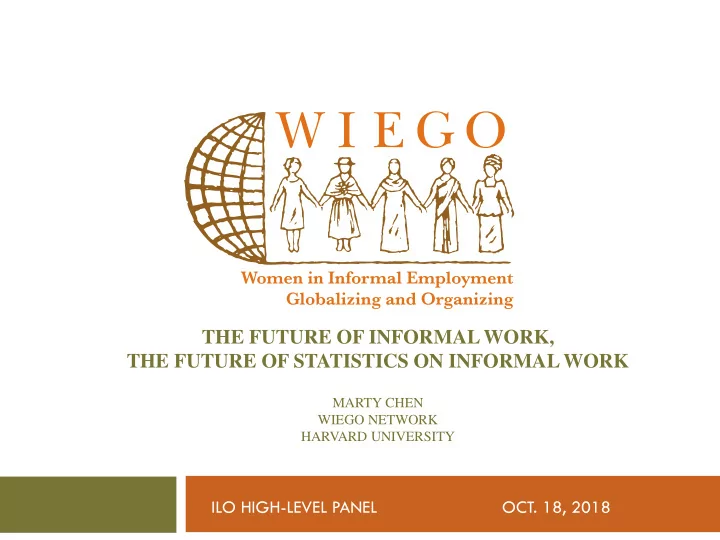

THE FUTURE OF INFORMAL WORK, THE FUTURE OF STATISTICS ON INFORMAL WORK MARTY CHEN WIEGO NETWORK HARVARD UNIVERSITY ILO HIGH-LEVEL PANEL OCT. 18, 2018
REMARKS ◼ Informal Work: Today – New Worldwide Data (ILO 2018) ◼ Informal Work: In the Future ◼ Statistics on Informal Work: Future Directions
INFORMAL WORK TODAY: SIGNIFICANCE % of Total, Rural & Urban Employment Globally & by Country Income Group & Geographic Region Country Income Groups * Total Rural Urban World 61 80 44 Developing 90 90 79 Emerging 67 83 51 Developed 18 22 17 * 2018 World Bank classification based on country levels of gross income per capita Geographic Regions (excluding developed countries) Total Sub-Saharan Africa (excluding Southern Africa) 92 Sub-Saharan Africa as a whole 89 South Asia 88 Southeast & East Asia (excluding China) 77 Middle East and North Africa 68 Latin America and the Caribbean 54 Eastern Europe and Central Asia 37 Source: ILO 2018
INFORMAL WORK TODAY: COMPOSITION By Status in Employment & Branch of Industry Globally & Country Income Group (%) Country Own Contributing Wage Self- Income Employed Employers Account Family Workers Groups Workers Workers World 36 64 3 45 16 Developing 21 79 2 54 22 Emerging 37 63 3 44 16 Developed 51 49 6 36 6 Country Income Agriculture Services Manufacturing Groups World 38 44 18 Developing 69 21 10 Emerging 36 46 19 Developed 10 71 19 Source: ILO 2018
THE FUTURE OF INFORMAL WORK ◼ existing informal self-employment : likely to persist – with some shifts across branches of industry, unless significant increase in formal jobs ◼ existing informal wage employment : likely to persist – with some shifts across branches of industry, unless significant increase in formal jobs ◼ informalization of once-formal wage jobs : likely to continue – in current climate of de-regulation & flexibilization of labour, unless labour markets are regulated or re-regulated ◼ new forms of informal wage jobs and/or dependent contractors : likely to emerge & increase – with growth of outsourcing, offshoring and digital platforms/gig economy, unless regulation of new forms of work ◼ workers displaced by automation : likely to resort to self-employment in the informal economy – in absence of unemployment insurance, employment guarantee schemes and safety nets, unless they acquire skills for new technology jobs and occupations In sum, the future of work is informal.
STATISTICS ON INFORMAL WORK: FUTURE DIRECTIONS Frontiers of Statistics on Informal Work … improved definition & international standards for measurement of informal employment - being discussed at 2018 ICLS city-level data – for an urbanized world data on specific groups of informal workers – to inform policies – see WIEGO guide http://www.wiego.org/publications/guide-obtaining- data-types-informal-workers-official-statistics data on informal enterprises (as share of all enterprises across different branches of industry + by size, ownership & place of work) – to inform enterprise development policies & schemes data on GDP contribution of informal workers inside and outside informal enterprises - to convince policy makers that they contribute to economic growth more & better data on informal employment in developed countries : using common framework for measuring informal employment in developed & developing countries
WAY FORWARD Future of Work o informal employment is, and is likely to remain, the norm o informal workers should not be ignored or stigmatized - but recognized & supported o appropriate policies & laws in support of informal workers should be developed The first step is good statistics on informal employment Future of Labour Statistics o increased data on informal work – more countries, including developed countries, measuring informal employment + making micro-data sets available to ILO and others o improved data on informal work – more & better use of official international definitions and standards for measurement o expanded data on informal work – city-level + specific groups of workers +informal enterprises
THANK YOU! On behalf of WIEGO and our Statistics Programme, Joann Vanek & Francoise Carré , I would like to thank... ICLS – for recognizing informal employment as an important component of labour force statistics ILO Statistics – for promoting improved statistics on informal employment Delhi Group – for promoting improved statistics on informal employment National Statistical Offices – for collecting statistics on informal employment WIEGO has enjoyed working with all of you for over two decades and we look forward to continuing to work together!
Recommend
More recommend